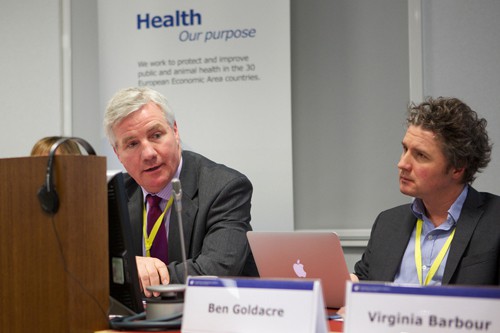
Bad Pharma author Dr Ben Goldacre (right) at an EMA meeting on transparency in 2012 (pic: EMA/Nada Photography)
The pharmaceutical industry is following an ‘inevitable policy trajectory’ toward clinical trial transparency, according to Bad Pharma author Dr Ben Goldacre.
Speaking exclusively to PMLiVE, he said the recent European Parliament committee vote on amending the Clinical Trial Directive proves the direction of travel “cannot be held back”.
“Industry is rapidly dividing into those who are capable of showing strong leadership on this issue – not to mention clarity of thought – and those who are trying to live in the past.
“It is senseless to resist this inevitable tide, when the personal and organisational risks of doing so are so high.”
On May 29 the European Parliament’s Committee on Environment and Public Health (ENVI) backed a series of amendments to the Clinical Trial Directive, to ensure greater transparency through a series of measures, including fines for pharma companies that do not comply.
Goldacre praised the work of UK MEP Glenis Willmott, who brought the amendments forward, saying her changes were pivotal in ensuring the Directive did not shy away from data disclosure.
“Without her [Willmott] I doubt these amendments would have made it, and the Directive in its previous guise didn’t seem to be hitting the right notes.”
The amendments must now be ratified by all Member States and a final vote is expected by autumn.
EFPIA remains cautious
But European pharma group EFPIA was cautious over the vote and the type of transparency Dr Goldacre is looking for.
In a statement to PMLiVE the group said: “As an industry we are concerned about the unbalanced approach adopted by the [MEPs] on the issue of confidentiality of clinical data.”
It said that while it supports the principles of transparency, there would always be a “need to protect patient confidentiality and commercially sensitive information in this process”, adding that amendments by Willmott could “jeopardise privacy, the integrity of regulatory systems, and incentives for investment in biomedical research in Europe”.
It went on: “The issue of data sharing has complex implications for patients, researchers, industry and our legislative and regulatory framework. These need to be fully understood before the issue can be addressed in legislation.”
Past data
One issue of concern to the industry is how to deal with trial data from medicines that are already on the market.
Dr Jean-Michel Cosséry, the new managing director of Lilly UK, said recently that patients would rather pharma companies’ spent money on developing new medicines, rather than using it to go over past data.
But for Dr Goldacre the concern is that the Directive may still allow companies to avoid dealing with historical data, as the legislation does nothing for access to trial results before 2014.
“There has been a widespread belief that it’s somehow okay to only obtain access to trial results starting ‘from now’,” Goldacre said. “That’s clearly not the case: in everyday clinical practice we use treatments that came to market – and were researched – in 2003, 1998, and so on. We need the evidence from this era to make informed decisions today, about the treatments we are using today.”
“There are some in pharma who seem to react as if this is somehow a matter of ‘catching people out’ – nothing could be further from the truth. This is a simple matter of ensuring that the evidence base for clinical decision making today is complete.”
AllTrials influence on vote
Dr Goldacre was one of the prime movers behind the establishment of the AllTrials campaign last year, which is lobbying for greater clinical trials access.
Notable signatories to the campaign include NICE, 80 patient groups and, its biggest coup, GlaxoSmithKline, which seemingly broke ranks with the rest of the pharma industry to support AllTrials.
No other pharma firm has yet signed up and the ABPI has denounced the campaign as nothing more than a “PR initiative”.
But Dr Goldacre said AllTrials had a major impact on the MEPs’ vote, and the campaign was becoming a strong counter-balance to pharma lobbying in Europe.
“I’m relieved to say that despite extensive industry efforts to brush the issue of withheld results under the carpet, AllTrials has been able to help patients and the public put this issue back on the map.”
He said that other groups including consumer group BECU and umbrella groups such as the European Association of Hospital Pharmacists, have all helped put the issue of trial transparency into the public’s imagination.
“Collectively there is no doubt we all had an impact on what would otherwise have been regarded as a dreary technical issue with little public engagement,” he concluded.




